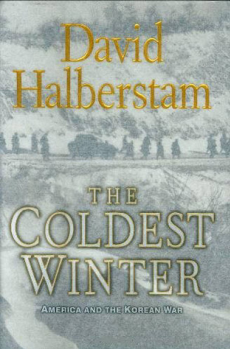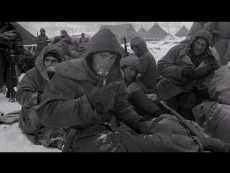
This book is the final in my series of comparison for a higher level of education book review example. This final book in the series takes a slightly different approach to the previous two, telling a story more than considering facts. However, as you will see this can still be useful to a historian if analysed appropriately.
Halberstam, David. The Coldest Winter: America and the Korean War. (Hyperion 2007)
True to its title, this work considers the Cold Winter that US troops found themselves stuck in after General Douglas MacArthur’s decision to push north of the Yalu River. David Halberstam, unlike the previous two authors, constructs a historical drama which has both its advantages and disadvantages but is best used in addition to more factual and reserved works such as that of Dorris Clayton James and even William Manchester too to a degree. Halberstam’s work is of most use to my independent essay and to the field with its central theme that is aggressively anti-MacArthur for his arrogance in the Korean conflict. This work is far from balanced and is overwhelmingly negative regarding the war, the US response and of course MacArthur but therefore when used correctly it portrays the feeling that the General invoked in many involved in the conflict; a conflict that the US simply weren’t prepared for.
In his approach Halberstam is incredibly passionate, seething as he describes the arrogance and foolishness of MacArthur. The book has been described as a ‘formidable achievement’ that provides justice to the frequently forgotten Korean War despite the deaths of some 45,000 Americans. In his desire to shame MacArthur and do justice to the atrocities of the war Halberstam cites numerous interviews and reports from veterans of the war, all of whom testify eagerly against the incompetent and removed ‘Dugout Dug’. The book is dramatic and is written with the intention to alarm and provoke anger which it does effectively. However this is not some nonsensical fiction, though a drama it is still very relevant and historically accurate as Halberstam’s core motive is to highlight the poor decisions of MacArthur but also the US Government too in their failure to react efficiently to the conflict. Even MacArthur’s eventual dismissal came too late and was largely due more to his public humiliation of Truman than his failure to deal with the war in Asia sensibly. Though the style is bitter, Halberstam effectively portrays a largely forgotten blunder in American history and his use of veteran’s accounts is very helpful to me in my independent essay and to the field in understanding the viewpoint of the marines and not just the generals or government officials as are usually recorded.

The obvious limitation of the book is that, primarily, it is a drama written with the primary purpose of creating dramatic effect and shock value, with historical teaching a secondary. Furthermore, there is a very strong revisionist perspective as the author expresses his distaste for the US and the way in which they allowed MacArthur to ‘run wild’. It is a heavily biased work and, quite the opposite of James’ reserved approach it does not acknowledge MacArthur as possessing a multitude of virtues and vices but instead repeatedly slanders his reputation. Lawrence Freedman notes that Halberstam does not hold back, citing MacArthur’s ‘arrogance, duplicity and misjudgments’ throughout his work. Whilst it is most certainly true that MacArthur did possess all of these traits on occasion, it is most useful to us as historians to always consider the ‘bigger picture’ and so although Halberstam is not necessarily incorrect, his book could benefit from a wider perspective before reaching his conclusions.
Taking this into consideration, Halberstam’s work may be less well known in the scholarly world than such works as American Caesar or James’ final work in his series on MacArthur, Triumph and Disaster, but it is still an undoubtedly useful, accurate and well researched source for both my Independent essay and the field of study on the US’ response to the Korean War and the dismissal of MacArthur. The Coldest Winter contributes drama to the field of study; acknowledging the necessity for historical accuracy but also providing a good argument and sense of direction. The bias is not necessarily a complete limitation because unlike James’ work and even Manchester’s to a degree, Halberstam does not only provide an account but also a well-researched and supported argument and that is what History is by its nature. Finally, Halberstam’s use of multiple veterans’ accounts from the war rather than just archives and government documents as many others have used give this book great credibility and so The Coldest Winter is a great contributor to the topic, proving that dramas can also be considered useful in historiography.
IMAGE 1:http://d.gr-assets.com/books/1326474263l/448135.jpg - The Book Cover.
IMAGE 2: http://i.ytimg.com/vi/BSSQHtZzLlE/hqdefault.jpg - US troops trying to stay warm in the Korean Winter.

0 Comment:
Be the first one to comment on this article.